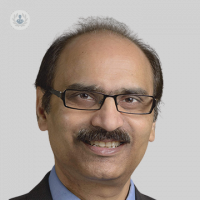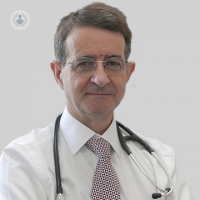What is interventional cardiology?
Interventional cardiology is the branch of cardiology that diagnoses and treats structural heart problems using catheters inserted through blood vessels.
Use of catheters
Catheters are thin tubes that can be used to perform a number of procedures. They are typically inserted into a large peripheral artery or vein (such as the femoral artery) and are fed through the blood vessel to the heart.
They may be used to gather data on the affected tissue by injecting a contrast agent that will show up on X-rays, for example. They can also be used to perform treatment, which may involve inserting replacement valves, placing stents, or even destroying problematic tissue or blood clots.

What conditions are treated by interventional cardiology?
Interventional cardiology may be used to treat a variety of conditions affecting the heart and/or adjacent blood vessels.
- Ischemic heart disease – this may be treated with angioplasty, stent placement, and/or coronary thrombectomy.
- Valve disease – problems with heart valves may be treated with valvuloplasty, percutaneous valve repair or valve replacement.
- Congenital heart disease – there are a number of heart defects that a person can be born with, such as atrial septal defects. Interventional cardiology techniques may be used to diagnose and repair them.
What procedures are included in interventional cardiology?
- Angioplasty – a minimally invasive procedure to widen narrowed blood vessels.
- Valvuloplasty – a procedure to repair defects in the heart valves.
- Coronary angioplasty (percutaneous coronary intervention) – angioplasty to treat blockages in the coronary arteries (the arteries responsible for supplying the heart muscle itself with blood) due to coronary artery disease. The procedure may involve the use of stents or balloon catheters.
- Percutaneous valve replacement – an alternative to open heart surgery, heart valves (including the aortic, mitral, and pulmonary valves can be replaced by less invasive methods, e.g. the TAVI procedure.
- Percutaneous valve repair – minimally invasive repair of the mitral valve. Options include the MONARC and MitraClip systems.
- Coronary thrombectomy – removal of a blood clot from the coronary arteries.
What are the alternatives to this treatment?
The main alternative in many cases is open heart surgery, which is performed by a cardiothoracic surgeon. The risks are often higher in open surgery. Interventional cardiology takes a high level of training and expertise to perform.
04-05-2018 01-12-2024Interventional cardiology
What is interventional cardiology?
Interventional cardiology is the branch of cardiology that diagnoses and treats structural heart problems using catheters inserted through blood vessels.
Use of catheters
Catheters are thin tubes that can be used to perform a number of procedures. They are typically inserted into a large peripheral artery or vein (such as the femoral artery) and are fed through the blood vessel to the heart.
They may be used to gather data on the affected tissue by injecting a contrast agent that will show up on X-rays, for example. They can also be used to perform treatment, which may involve inserting replacement valves, placing stents, or even destroying problematic tissue or blood clots.

What conditions are treated by interventional cardiology?
Interventional cardiology may be used to treat a variety of conditions affecting the heart and/or adjacent blood vessels.
- Ischemic heart disease – this may be treated with angioplasty, stent placement, and/or coronary thrombectomy.
- Valve disease – problems with heart valves may be treated with valvuloplasty, percutaneous valve repair or valve replacement.
- Congenital heart disease – there are a number of heart defects that a person can be born with, such as atrial septal defects. Interventional cardiology techniques may be used to diagnose and repair them.
What procedures are included in interventional cardiology?
- Angioplasty – a minimally invasive procedure to widen narrowed blood vessels.
- Valvuloplasty – a procedure to repair defects in the heart valves.
- Coronary angioplasty (percutaneous coronary intervention) – angioplasty to treat blockages in the coronary arteries (the arteries responsible for supplying the heart muscle itself with blood) due to coronary artery disease. The procedure may involve the use of stents or balloon catheters.
- Percutaneous valve replacement – an alternative to open heart surgery, heart valves (including the aortic, mitral, and pulmonary valves can be replaced by less invasive methods, e.g. the TAVI procedure.
- Percutaneous valve repair – minimally invasive repair of the mitral valve. Options include the MONARC and MitraClip systems.
- Coronary thrombectomy – removal of a blood clot from the coronary arteries.
What are the alternatives to this treatment?
The main alternative in many cases is open heart surgery, which is performed by a cardiothoracic surgeon. The risks are often higher in open surgery. Interventional cardiology takes a high level of training and expertise to perform.


What is interventional cardiology?
By Dr Kare Tang
2025-02-05
Interventional cardiology is a minimally invasive, non-surgical approach to investigate and treat a variety of heart diseases. We spoke to Dr Kare Tang, a top cardiologist from London to ask him to explain exactly what this subspecialty of cardiology involves and what conditions it can help treat. See more


Can your smart watch detect atrial fibrillation?
By Dr Fu Siong Ng
2025-02-03
Atrial fibrillation is the most common heart rhythm disorder, whereby an irregular heartbeat can lead to breathlessness, palpitations and fatigue. Unfortunately, the condition puts patients at higher risk of blood clots and strokes, so careful management is required. To give an all-you-need-to-know guide to atrial fibrillation, renowned consultant cardiologist Dr Fu Siong Ng offers expert insight on diagnosis and treatment of the condition, as well as discussing how the condition can be prevented. See more


Interventional cardiology: a deeper look inside
By Dr Niket Patel
2025-02-03
Interventional cardiology allows the heart to be operated on without the need for open heart surgery. How is this possible? Esteemed, London-based consultant interventional cardiologist Dr Niket Patel discusses his area of expertise, looking at how more and more patients are being treated with interventional cardiology. See more


Establishing and treating the causes of cardiac chest pain: the interventional cardiologist's point of view
By Dr Giovanni Luigi De Maria
2025-01-29
We gain specialist insight on the causes of cardiac chest pain from highly respected consultant interventional cardiologist Dr Giovanni Luigi De Maria on how cardiac causes of chest pain can be diagnosed and the available treatment options. See more
Experts in Interventional cardiology
-
Dr John Gerry Coghlan
CardiologyExpert in:
- Pulmonary hypertension
- Interventional cardiology
- Shortness of breath
- Hypertension (high blood pressure)
- Connective tissue disease
- Angina
-
Dr Deepak Goyal
CardiologyExpert in:
- Coronary heart disease
- Hypertension (high blood pressure)
- Heart failure
- Interventional cardiology
- Coronary angiography
- Palpitations
-
Dr Peter Clarkson
CardiologyExpert in:
- Cardiovascular Medicine
- Coronary heart disease
- Heart failure
- Coronary angiography
- Interventional cardiology
- Pacemaker
-
Professor James Spratt
CardiologyExpert in:
- Coronary heart disease
- Coronary angioplasty
- Family history of heart disease
- Minimally invasive techniques
- Interventional cardiology
- Cardiovascular disease
-
Dr Rasha Al-Lamee
CardiologyExpert in:
- Coronary heart disease
- Coronary angioplasty
- Interventional cardiology
- Cardiac rehabilitation
- Catheter
- Pacemaker
- See all

Cleveland Clinic London Hospital
Cleveland Clinic London Hospital
33 Grosvenor Place, SW1X 7HY
No existe teléfono en el centro.
By using the telephone number provided by TOP DOCTORS, you automatically agree to let us use your phone number for statistical and commercial purposes. For further information, read our Privacy Policy
Top Doctors

Spire Little Aston Hospital
Spire Little Aston Hospital
Little Aston Hall Drive, Sutton Coldfield, B74 3UP
No existe teléfono en el centro.
By using the telephone number provided by TOP DOCTORS, you automatically agree to let us use your phone number for statistical and commercial purposes. For further information, read our Privacy Policy
Top Doctors

The Parkside Suite Wexham
The Parkside Suite Wexham
Wexham Park Hospital, SL2 4HL, Berkshire
No existe teléfono en el centro.
By using the telephone number provided by TOP DOCTORS, you automatically agree to let us use your phone number for statistical and commercial purposes. For further information, read our Privacy Policy
Top Doctors
-
Cleveland Clinic London Hospital
33 Grosvenor Place, SW1X 7HY, Central LondonExpert in:
- Cardiology
- Colorectal surgery
- Minimal access surgery (keyhole surgery)
- Gallbladder surgery
- Diagnostic Imaging
- Ultrasound
-
Spire Little Aston Hospital
Little Aston Hall Drive, Sutton Coldfield, B74 3UP, Sutton ColdfieldExpert in:
- Bariatric Surgery
- General Surgery
- Orthopaedic surgery
- Robotic Surgery
- Diagnostic Imaging
- Ophthalmology
-
The Parkside Suite Wexham
Wexham Park Hospital, SL2 4HL, Berkshire, WexhamExpert in:
- Colorectal surgery
- General Surgery
- Breast augmentation
- Dermatology
- Obstetrics and Gynaecology
- Medical Oncology
- See all
- Most viewed diseases, medical tests, and treatments
- Cardiovascular disease
- Cardiac screening
- Electrophysiology study
- Genetic testing
- Minimal access surgery (keyhole surgery)
- Aortic aneurysms
- Anxiety
- Long Covid
- Medicolegal
- Robotic surgery








